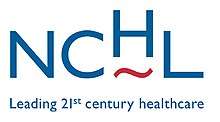National Center for Healthcare Leadership
The National Center for Healthcare Leadership (NCHL) is a U.S.-based non-governmental organization that was established to pursue excellence in leadership development in health and health care systems, as well as in degree programs related to healthcare management. NCHL pursues this mission through a combination of research, thought leader convening, facilitation of inter-organizational collaboratives, and dissemination of findings through white papers and videos from its annual events.
 | |
| Formation | 2001 |
|---|---|
| Type | Not-for-profit |
| Headquarters | Chicago, IL, USA |
| Location |
|
Membership | Organizational |
President | Tim Rice |
| Website | www.nchl.org |
History
NCHL was founded in 2001, as the result of a national summit on healthcare leadership funded by the Robert Wood Johnson Foundation, which identified a need for greater emphasis within the health sector on adopting organizationally-based leadership development practices. During its early years, NCHL supported an Advanced Leadership Development Program for healthcare executives, and developed the validated National Health Leadership Competency Model.[1][2] in collaboration with the Hay Group. NCHL also established an invitational symposium and national leadership award dinner, which is held every November in Chicago.
In the mid-2000s NCHL, in collaboration with the accrediting body ACEHSA, supported the evolution of graduate healthcare management education from a knowledge-based to a competency-based approach.[3] By 2007, competency-based education had become an established part of the accreditation process, and was expanded further in the 2013 revision of the accrediting guidelines.[4]
In Spring of 2011, NCHL developed a joint operating agreement with Rush University Medical Center and the Griffith Leadership Center of the University of Michigan School of Public Health.[5] The agreement was pursued in recognition of changing healthcare leadership development needs associated with the implementation of the Patient Protection and Affordable Care Act.[6]
In 2013, NCHL's programs were expanded to include the US Cooperative for International Patient Programs, an organizational membership program with a mission to expand global access to US expertise in high-quality healthcare. In 2014, NCHL established a coordinated improvement effort for administrative fellowships, the National Council for Administrative Fellowships.[7] Members include hospitals and health systems that sponsor these post-graduate fellowships, as well as accredited graduate health management programs with a focus on preparing students for careers in the profession of health management.
Current activity
The programs of NCHL are supported primarily through dues contributed by organizational members.[8] Participants in NCHL programs, called Councils, vary based on the specific program, but generally involve leaders who are responsible a specific leadership activity within their own health system or university. Participants identify and prioritize areas in which support from NCHL can help pursue improvements collaboratively.
In addition to Councils, NCHL maintains a validated interprofessional health leadership competency model, which is made available to the field via their website. NCHL also operates an awards program that recognizes health systems for their use of evidence-based practices in leadership development. The survey used by the program receives updates based on emerging research on the science of leadership development. Data generated by survey takers has been used to assess relationships between leadership development practices and specific health system outcomes such as financial performance [9] and patient experience.[10]
See also
References
- "Leadership model" (PDF). nchl.org. Retrieved 2019-05-21.
- Calhoun, J.; et al. (2008). "Development of an interprofessional competency model for healthcare leadership". Journal of Healthcare Management. 53:6: 375–391.
- Carlson, J. (January 19, 2004). "Masters of the universe. NCHL, national accrediting agency push controversial plan to transform how MHA programs teach future healthcare execs". Modern Healthcare. 34 (3): 6–7, 14–15.
- Criteria for Accreditation (Accrediting guidelines self-study document) (PDF), Commission on Accreditation of Healthcare Management Education, 2011, archived from the original (PDF) on 2012-03-30
- Carlson, J. (January 10, 2011). "Changes for NCHL: Organization's new identity in transition". Modern Healthcare. 41 (2): 12. PMID 21287868.
- "Timeless Truths". Modern Healthcare. 2 May 2011.
- "Data". nchl.org. Retrieved 2019-05-21.
- "About NCHL". Nchl.org. Retrieved 2019-05-21.
- Crowe, Daniel; Garman, Andrew; Li, Chien-Ching; Helton, Jeffrey; Anderson, Matthe; Butler, Peter (2017). "Leadership development practices and health system financial outcomes". Health Services Management Research. 30 (3): 140–147. doi:10.1177/0951484817702564. PMID 28391712.
- Li, Chien-Ching; Barth, Peter; Garman, Andrew; Anderson, Matthew; Butler, Peter (2017). "Leadership development practices and patient satisfaction: A study of U.S. Academic Medical Centers". Patient Experience Journal. 4 (1): 97–102.
External links
- Official website
- "Appendix 1", New National Center for Healthcare Leadership Creates Source for Better Management Education and Training (Early history of NCHL), The Robert Wood Johnson Foundation, June 2006